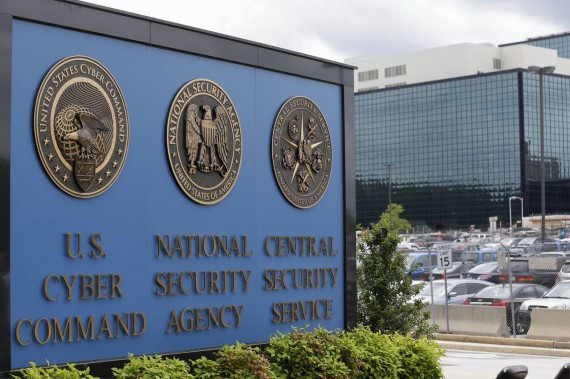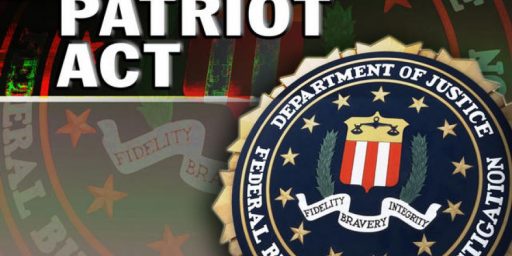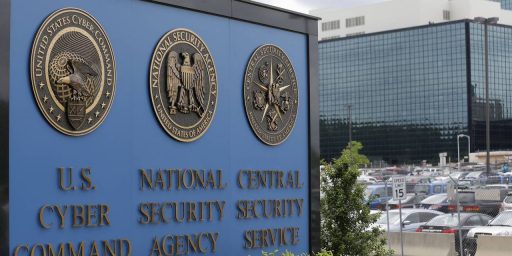Senate Fails To Pass PATRIOT Act Renewal
The Senate went home last night without passing a bill to renew the PATRIOT Act, which expires at the end of the month.
The Senate left town early this morning without passing a bill to renews the PATRIOT Act due in no small part to a rebellion against N.S.A. surveillance programs led by Kentucky Senator Rand Paul and a group of mostly Democratic allies:
WASHINGTON — After vigorous debate and intense last-minute pressure by Republican leaders, the Senate on Saturday rejected legislation that would end the federal government’s bulk collection of phone records.
With the death of that measure — passed overwhelmingly in the Houseearlier this month — senators then scrambled to hastily pass a short-term measure to keep the program from going dark when it expires June 1 but failed. The disarray in Congress appeared to significantly increase the chances that the government will lose systematic access to newly created calling records by Americans, at least temporarily, after June 1.
“This is a high-threat period,” said Senator Mitch McConnell of Kentucky, the majority leader, who was felled in his efforts to extend the program even for a few days by the junior senator for his home state, Rand Paul.
The Senate will reconvene on May 31 to try again. But any extension is far from certain to get approval from the House, which is in recess until June 1, with at least one member threatening to block it.
“Any extension is going to be problematic in the House,” said Representative Adam B. Schiff of California, the ranking Democrat on the House Intelligence Committee. Mr. Schiff noted that many of the votes against the measure in the House were by members who didn’t think it went far enough. The matter is likely to come up after the one-week recess.
Under the bipartisan House bill, which passed 338 to 88 last week, thePatriot Act would be changed to prohibit bulk collection by the National Security Agency of metadata charting telephone calls made by Americans.
However, while the House version of the bill would take the government out of the collection business, it would not deny it access to the information.
The measure failed in the Senate 57 to 42, with 12 Republicans voting for it, shortly after midnight because Mr. Paul, a candidate for the White House, dragged the procedure out as he promised to do in fund-raising tweets and emails.
Another bill, which would have extended the program for two months, also failed.
Even if both chambers do agree to an extension of the statute, the program might still lapse. President Obama would have to make the legal and political decision to ask the nation’s intelligence court for a new order authorizing the bulk phone logs program, and a Federal District Court judge on the court would have to agree that he was authorized to issue such an order, even though a federal appeals court recently ruled that the statute cannot be legitimately interpreted to permit bulk collection.
Still, while a short-term lapse in the bulk phone records collection could have large political repercussions, it might have only a limited operational impact on counterterrorism investigations. Throughout the lifetime of the once-secret program, which began in October 2001, it has never been the difference maker in thwarting any terrorist attack, according to testimony and government reports.
The Washington Post has more details:
Senators left Capitol Hill early Saturday morning without taking action to extend or replace a controversial surveillance program set to expire at month’s end, paralyzed by a debate over the proper balance between civil liberties and national security.
In an after-midnight vote, the Senate turned back a House-passed bill that would end the National Security Agency’s bulk collection of private telephone records, the only legislation that offered a smooth transition ahead of a June 1 deadline.
A small cadre of senators, led by Rand Paul (R-Ky.), then rejected a variety of short-term extensions to the current authority in a dramatic floor exchange. That led Majority Leader Mitch McConnell (R-Ky.) to recall senators to the Capitol a day earlier than planned, on May 31, for a rare Sunday session hours ahead of the deadline.
The rejection of the compromise legislation was the latest turn in a complex standoff over government surveillance authority that has pitted Democrats, House Republican leaders, Senate Republican leaders and Paul, a presidential candidate, against one another as members of Congress eyed a week-long holiday break.
It is unclear what difference a week will make. The positions of national security hawks like McConnell and civil libertarians like Paul have barely softened, while the House-passed, White House-supported compromise measure was unable to gain the 60 votes necessary to proceed. A procedural vote on the bill failed 57-42.“Sometimes things change as deadlines approach,” Paul said as he left the Capitol early Saturday.
In floor remarks, he demanded simple-majority votes on two amendments to the House bill, known as the USA Freedom Act, in order to drop his opposition to moving it forward. “Our forefathers would be aghast,” he said about the spy program.
After McConnell ended debate, Paul tweeted, “The Senate will return one week from Sunday. With your help we can end illegal NSA spying once and for all.”
Sen. John Cornyn (R-Texas), McConnell’s top leadership deputy, said after the votes that “Sen. Paul is asking for something that nobody will agree to.” The amendments Paul is seeking, he said, would not comport with Senate rules.
“My hope is in the meantime … after everybody gets a good night sleep and is thinking clearly, that we can figure a way forward on this,” Cornyn said.
Frustration with Paul — especially from fellow Republicans — became increasingly obvious as the long night wore on. Paul held the Senate floor for nearly 11 hours Wednesday to decry any extension of current law, and many had hoped that “performance,” as Sen. John McCain (R-Ariz.) called it, would suffice
It did not. Paul objected to a 7-day extension to the current law, taking advantage of Senate rules protecting the right of an individual senator to oppose quick action on any question. McConnell then proposed, in turn, four-day and two-day extensions, which were opposed by Democrats Ron Wyden (Ore.) and Martin Heinrich (N.M.), respectively.
When McConnell finally offered a one-day extension, Paul objected again, prompting the unusual Sunday session.
“There’s a new breed in the Senate, and we have seen the manifestation of it,” McCain said.” One or two or three are willing to stand up against the will of the majority. Some time ago, the Senate people would sit down and try to work things out. And obviously these individuals don’t believe in that. But I’m sure it’s a great revenue raiser.”
Where things proceed from here is entirely unclear, though it seems likely that some compromise will eventually be reached that will allow the reform bill that the House passed to go forward. This could be something as simple as allowing Senator Paul to put his amendments up for a vote, which appears to be the main thing holding up cloture at this point, or it could involve Mitch McConnell finding the three votes he needs to invoke cloture and get to a final vote, although even that doesn’t necessarily mean McConnell’s problems would be behind him since it’s not clear that his majority would hold together on a vote for final passage. The biggest issue facing him and supporters of PATRIOT Act renewal, though, is that any amendments that are made to the USA Freedom Act by the Senate would require approval of House, which currently isn’t scheduled to return to Washington until after June 1st, which is the day that the PATRIOT Act expires. Theoretically, of course, it wouldn’t be be too disruptive if the bill lapsed for day or two only to be reinstated after the House, but it’s clear that powers that be in Washington would prefer for that not to happen especially since the White House has admitted that it has no fallback plan if the PATRIOT Act is not renewed
The issue holding up renewal of the PATRIOT Act, of course, revolves around the data mining programs of the National Security Agency, at least part of which are authorized by Section 215 of the Act. The bill passed by the House, USA Freedom Act, would amend that program by ending the ability of the N.S.A. to collect and story the data on its own. Instead, individual telecommunications companies would be required to hold on to the data and the Federal Government would only be able to access the data via applications to the “secret court” authorized under the Foreign Intelligence Advisory Act to handle warrant requests that deal with classified intelligence matters. Some Senators, such as Rand Paul and Ron Wyden, have argued that even this change doesn’t go far enough, and have proposed amendments that would place further restrictions on the N.S.A.’s Section 215 powers. It is those amendments that held up the bill last night and now seem to be threatening to cause it to expire.
Even with Senator Paul’s eleven hour speech on Wednesday, it didn’t seem up until the last minute as though there would be any real problem passing PATRIOT Act renewal, so this outcome if something of a surprise and certainly a setback for Mitch McConnell who until now has had a fairly smooth run as Senate Majority Leader. In the end, though, the controversy over the act itself, and especially over the National Security Agency’s data mining programs, seems to have proved to be too much for McConnell and other supporters of the law to overcome. No doubt, their case was not helped when, earlier this week, the F.B.I. essentially admitted that Section 215 of the PATRIOT Act, which authorizes the mass surveillance programs that the N.S.A. undertakes, had not assisted in the investigation or prosecution of a single major terrorism case since it was passed into law. Given that, one wonders why even need the NSA’s data mining program to begin with.






“,,,White House has admitted that it has no fallback plan if the PATRIOT Act is not renewed.”
Sure they do. They will just do it illegally.
OMG, they have failed to reverse the sunset provisions of a law which has “not assisted in the investigation or prosecution of a single major terrorism case since it was passed into law.”
My only regret is that this overreaching, Orwellian-named piece of junk only has a few areas of sunsetting provisions instead of the whole thing.
I think I’ll just finish my coffee now.
@edmondo:
Now there’s a legitimate “both sides do it”. I figure either the president has access to some super secret information that causes them to take these actions, or perhaps just the responsibility for the safety of 300 million Americans causes people in that position to quiver in fear and allow anything to happen which promises to help. The sense of responsibility must be overwhelming.
Good! My only regret is the entire law didn’t have a sunset clause. And while we are at it lets do away with the Orwellian Department of Homeland Security.
@Ron Beasley: Especially the abject idiocy of the TSA.
I expect the Republicans in Congress will remedy this as soon as they return. If they have to diminish Paul, they will. This does not bode well for his future in the Republican party.
What do the people of Kentucky think about all of this?
@Mr. Prosser: I agree. When I fly for medical reasons I must fly 1st class. What this means is I go through minimal security – I don’t have to take off my shoes or take my laptop out of the bag. In fact about the only thing I have to do is go through the same X-Ray machine we had to go through prior to 911. I have not had an additional background check.
@Ron Beasley:
Just curious Ron, what airline are you flying? Or out of what airport?
I fly first a lot but the people at security certainly don’t know it and I go through the same security as everyone else.
@Davebo: United between Portland and Houston.
That’s a fairly bold statement since we have already had a threatened shut down over the Homeland Security Budget, the Iran Letter and at least two much ado about nothing (considering the final passing margin) confirmation squawks, plus the theater of at least one presidential veto that wasn’t over-ridden – in just four or five months. Not too mention the antics of various presidential contenders.
Checking List of Acts in 114th Congress in Wikipedia shows only 13 pretty uncontroversial actions taken, so Mister McConnell has only had a smooth run in the sense he has had almost no presence whatsoever during the ongoing fiasco.
But without the Patriot Act, how will we unconstitutionally gather evidence against drug dealers?
This is all well and good, but I fully expect that the phone companies are taking this exact same metadata and crunching it for marketing purposes. And by “fully expect” I mean “know people who actually work on this with data from a foreign telecom where that country has a similar lack of privacy protections for consumers as the US”.
Imagine someone browsing through your records to see if you are calling doctors, wedding planners, pizza parlors, landscapers, repair men, or are receiving calls from debt collectors.
If people are going to be looking at every phone call I make, I might as well get something out of it, like slightly increased security.
There is a double-secret Patriot Act. Congressional representatives were allowed to review that act but only under highly restricted conditions. First, no staffers were allowed and any notes taken had to be returned before leaving the reading room. Second, the representatives had to review the bill while blindfolded. Third, the bill was written with invisible ink and not actually in the room with the reps. Instead the reps were given blank sheets of paper.
No, wait! That’s the current trade agreement. The double-secret Patriot Act was reviewed by no one in order to keep the secrets safe from our enemies.
@Gustopher:
But you don’t get any slightly increased security. Not at all.
Also, “if A is violating my rights, then B should be able to violate my rights too” isn’t exactly the strongest argument as compared to “no one should be violating my rights.” In this case you’re arguing that the more wrongs there are, the more they make a right, which is insane.
@James Pearce:
I wonder. As far as I can tell from looking at conservative web sites many, maybe most, letter writers are against the Patriot Act. The Republicans might be happy to let this die just to keep internal fighting down.
Republicans want it both ways – they actually want the scrutiny and virtual carte blanche surveillance of telecommunication data that has gone on for over a decade AND they want the political advantages that accrue to being strong on national security and monitoring potential terrorist activities BUT they sense that the public wants a rollback in the scope of the Patriot Act. I’m not sure if they know how they want to vote on this. Democrats are well-advised to let Republicans come up with a majority to support any measure.
What’s really surprising to me is that with Republican control of the Senate comes the same dysfunction that characterized the Republican House. Who could have seen this coming?